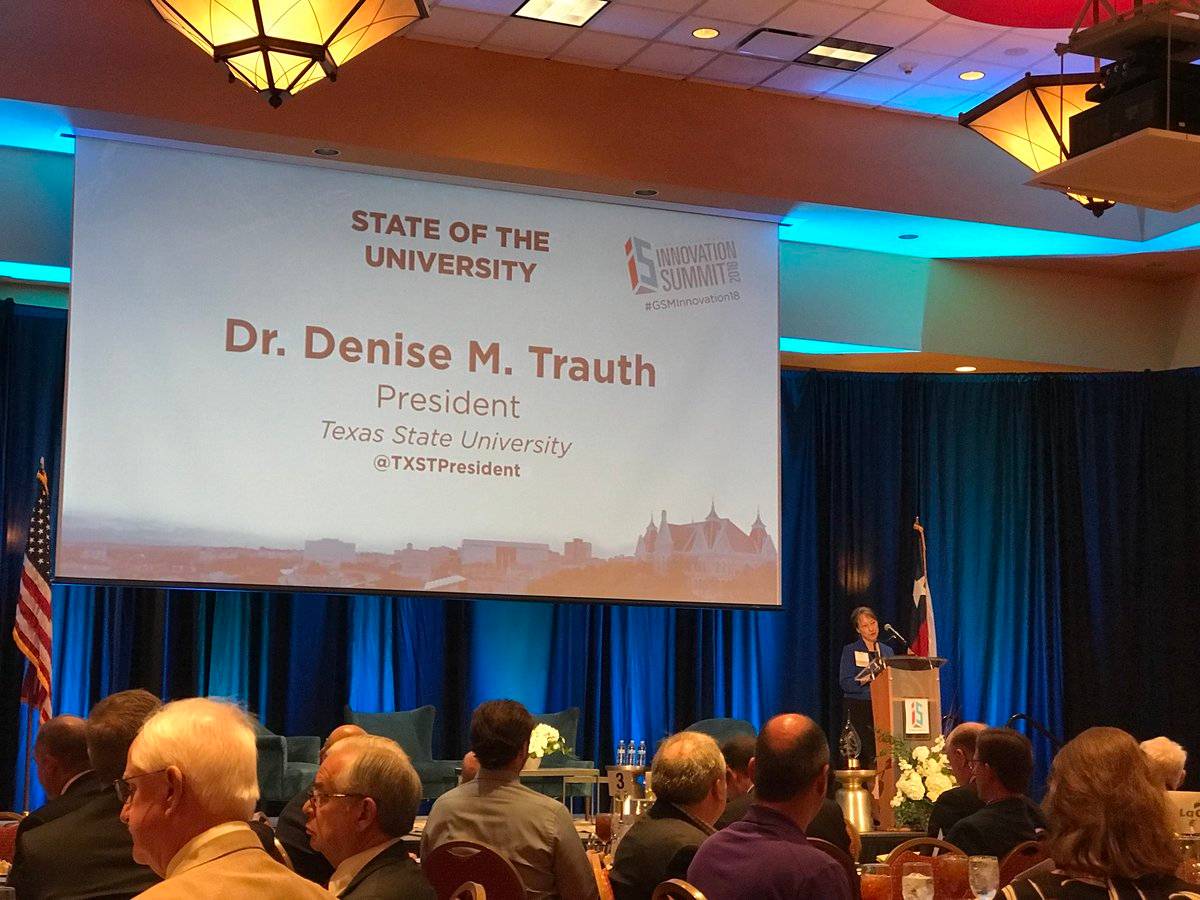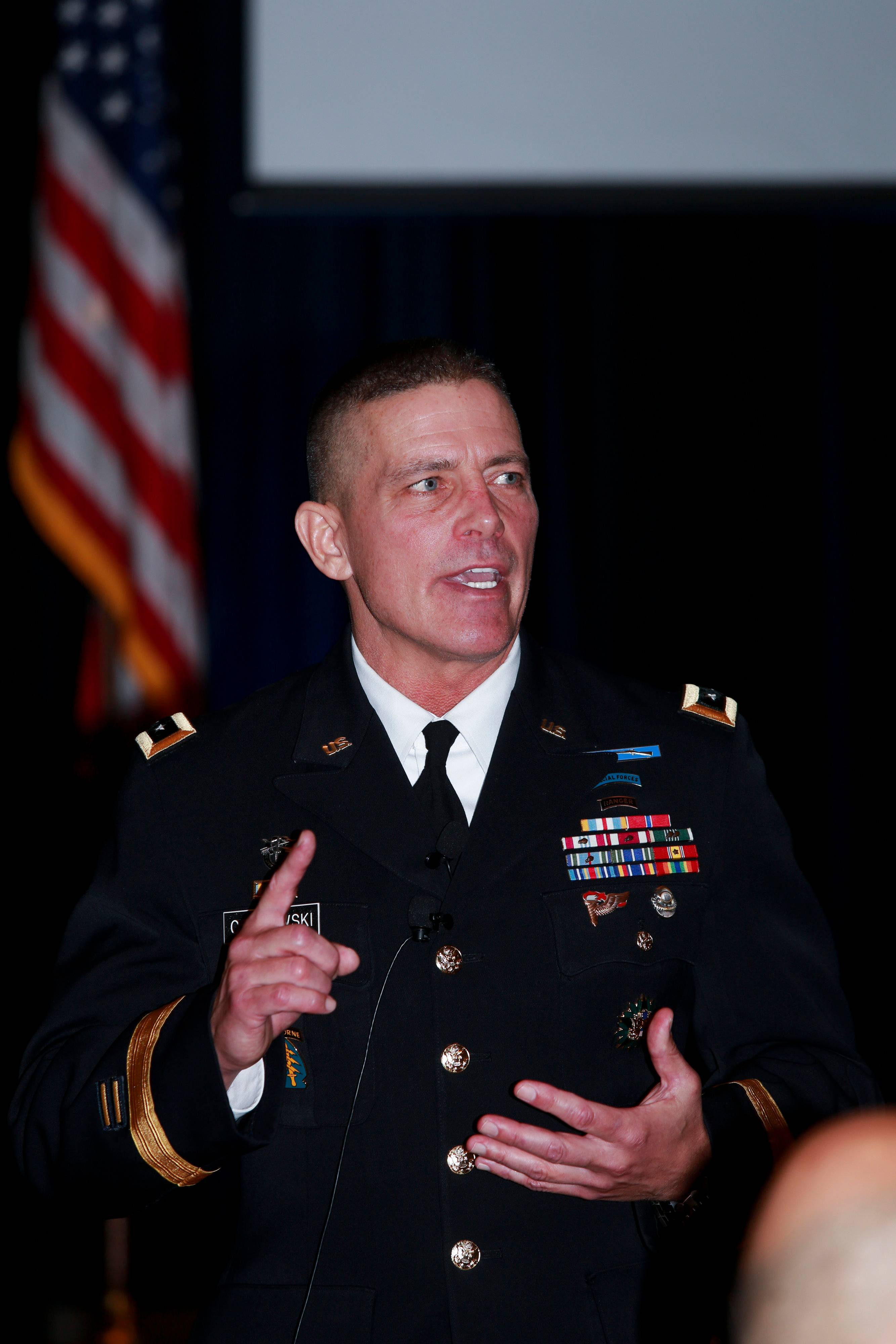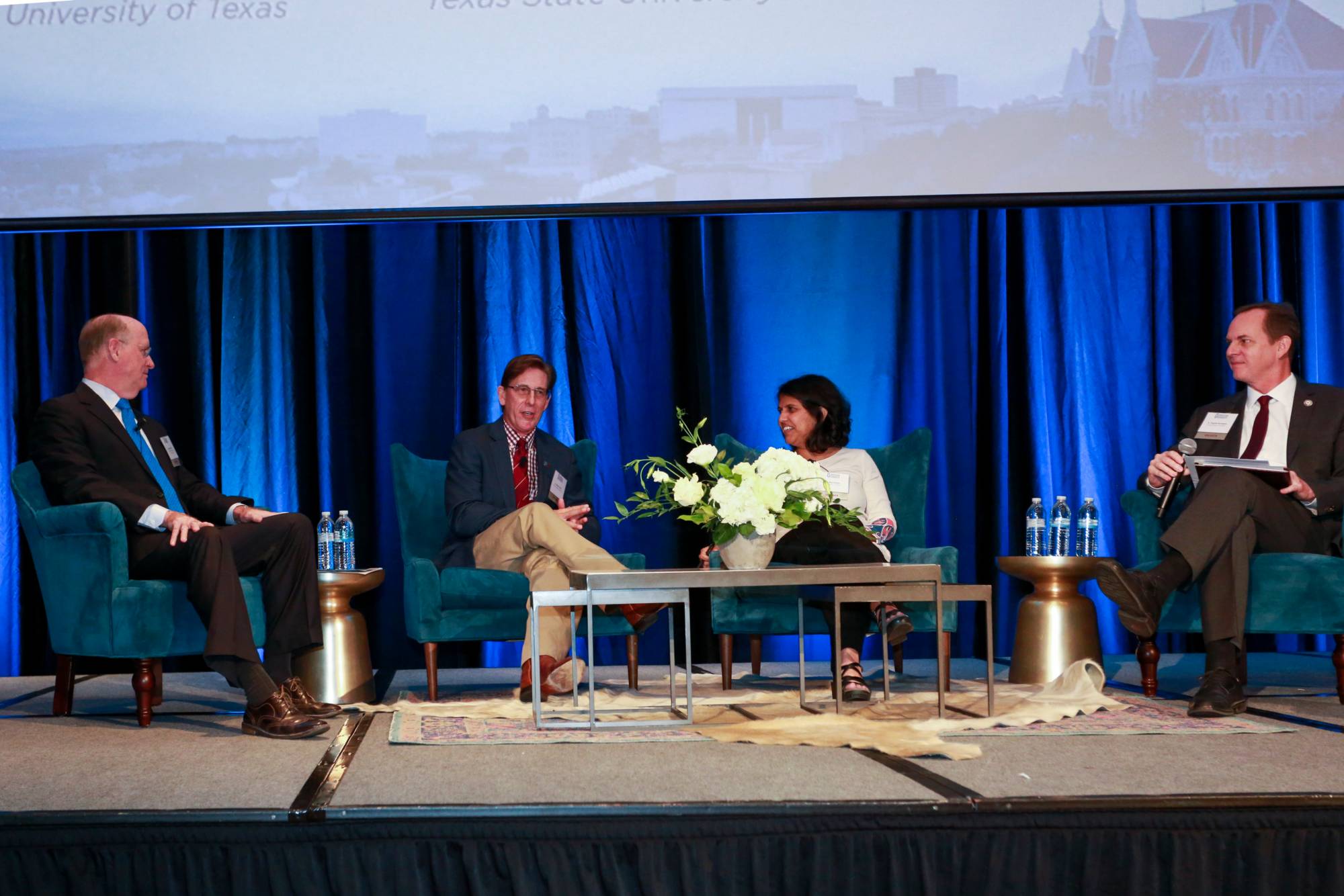Leaders converge at summit to explore impact of Texas Innovation Corridor
Research & Innovation
Yvonne Rhodes | September 26, 2018
Approximately 200 entrepreneurs, researchers and leaders in higher education and government gathered at the Innovation Summit hosted by the Greater San Marcos Partnership in collaboration with Texas State University on September 25. It was one of over 50 events that are part of Innovation Week at Texas State. Speakers included Texas State President Denise Trauth; a panel of leaders from major universities in the Innovation Corridor; and a keynote address by Lieutenant General Paul Ostrowski of the Army Futures Command. The higher education panel featured Dr. Mini Kahlon from University of Texas, Robert McKinley from University of Texas San Antonio, and Dr. Walt Horton from Texas State University.

The summit featured an in-depth look at the impact that higher education, research, commercialization, and innovation have on the future of the regional economy.
President Trauth shared the following updates on three innovative initiatives at Texas State: entrepreneurial boot camps; the Translational Health Initiative; and smart infrastructure in the civil engineering program in development.
1. Entrepreneurial boot camps
“Students in our computer science PhD. program and our Materials Science, Engineering, and Commercialization Ph.D. program complete two entrepreneurship boot camps to learn how to start their own business - and the programs have a phenomenal track record. Since 2014 they have launched five Ph.D. student led companies that create groundbreaking products.
One developed lithium ion batteries that charge in minutes rather than hours, with double the battery power. Another created a tasteless protective coating for fruits and vegetables that triples their shelf life to reduce food waste. Another Ph.D. student-led company uses rice husk to produce nanoparticles which can be used in paint or cosmetics. Another one developed a solar collector with optical fiber to provide indoor lighting. And yet another of these Ph.D. student-led companies developed a water treatment product for water generated in the oil field.”
2. Translational Health Initiative
“Through the Translational Health Research Initiative, we are improving the health of Texas by applying research findings to address critical medical needs. We have 225 faculty actively engaged in health research and over 80 degree programs that include health-related instruction and research opportunities. Through this initiative, we are researching behavioral interventions that improve the skills of children with autism; communication barriers that prevent life-saving marrow donations; and the impact of nutrition on cognitive function of breast cancer survivors - just to name a few.”
3. Smart infrastructure
“Through smart technologies and sensors, we can collect an incredible amount of data that provides insight into the condition of our bridges, buildings, roadways, water systems, and treatment plants. Safer bridges and more efficient water delivery systems and power grids are just the beginning of what these new technologies can do," President Trauth said.
President Trauth went on to describe the new bachelor’s in civil engineering that is under review by the Texas Higher Education Coordinating Board and the Southern Association of Colleges and Schools Commission on Colleges. If approved, the new civil engineering program will launch next fall and be the first in Texas with a holistic emphasis on technology-enhanced infrastructure.
“In addition to studying all the things in a traditional civil engineering program, our students will work with monitoring sensors, advanced communication systems, predictive analytics tools, and infrastructure management technologies,” said President Trauth.
SNAPSHOT OF INNOVATION SUMMIT HIGHLIGHTS
Mayor John Thomaides announced that the city council adopted two innovation districts in San Marcos: 1) downtown and 2) Texas State’s STAR Park, which the Mayor dubbed “clusters of innovation.” He said that the city’s natural beauty and proximity to two major cities, as well as partnerships between the city, schools, industry, and academia, fuel innovation in the region. A stakeholder advisory group will meet in early October to discuss the innovation districts.

KEYNOTE SPEAKER: LT. GEN. PAUL OSTROWSKI
Lieutenant General Paul Ostrowski spoke about the Army Futures Command and their modernization efforts. He serves as the Principal Military Deputy to the Assistant Secretary of the Army for Acquisition, Logistics and Technology and Director of the Army Acquisition Corps. The Futures Command was established to assess the future operational environment, emerging threats, and new technologies in order to develop modern solutions to meet soldiers' wartime needs. Key takeaways from his presentation include the following:
- For the Army, there are three dials, that he called “must pay bills”: people, readiness and modernization. The Army has been on a “modernization vacation,” which he said was the right choice to free up the Army to prioritize the other dials.
- The Army has been “incredibly busy,” with more than 180,000 soldiers in more than 140 countries. Our nation has been at war for the last 17 years. Right now there are tens of thousands of soldiers in South and North Carolina providing humanitarian aid in the aftermath of the flooding.
- We must be prepared for war in different environments -- land, air, maritime, cyber and space.
- The Army is only engaged with about 5,000 companies to meet their needs, out of millions of companies, so the Army is missing out on what many other companies have to offer.
- The Army chose Austin for its new headquarters for the quality of life, and because of the technology and innovation happening in the Innovation Corridor.
- Lt. Gen. Ostrowski wondered what the battlefields will look like in 2030, and how new technologies like artificial intelligence and robotics will change those environments.
- “We don’t know the impact these things will have, but we must get after that or our competitors will… By using disruptive technologies, we can change the way our Army fights.”
- “We must be the most lethal, situationally aware, combat force on earth - and that will begin right here in the Innovation Corridor in Texas.”
HIGHER EDUCATION PANEL
The higher education panel, moderated by Dr. Eugene Bourgeois, Provost and Vice President for Academic Affairs, discussed how the three institutions are working collectively to impact economy, research and commercialization.
- Dr. Mini Kahlon - Vice Dean, Health Ecosystem, Dell Medical School, University of Texas
“Healthcare is working to modernize itself, like our keynote speaker discussed about the Army. That modernization shouldn’t occur just in hospitals, but in our homes, our cars, wherever we are in our lives. To create healthcare solutions, we must focus on the settings and work our way backwards.” - Dr. Walter Horton - Associate Vice President for Research and Federal Relations, Texas State University
“Universities are very good at creating the raw materials for commercialization, which is where tech transfer comes in. It’s really about creating something new and handing it off to the right partner in industry who knows how to make it profitable.” - Robert McKinley - Senior Vice President of Economic Development, University of Texas San Antonio
McKinley spoke about higher education research from an economic development lens, and referenced the economic opportunity of the Army’s modernization efforts. “Hearing the Army say they need to engage with thousands of new companies is music to our ears and should be a battle cry for us.”

DICK BURDICK AWARD WINNER: BAUTEX SYSTEMS
The 2018 Dick Burdick Award for Innovation was presented to Bautex Systems, a company that provides builders and architects with versatile building materials and solutions. The Burdick Award, named after the late Dick Burdick, was created to recognize area companies that are thinking outside the box and finding creative solutions to problems. Past winners include Paratus Diagnostics, MicroPower Global, Quantum Materials, and Thermon. All past winners except Thermon are Texas State STAR Park companies
Share this article
For more information, contact University Communications:Jayme Blaschke, 512-245-2555 Sandy Pantlik, 512-245-2922 |